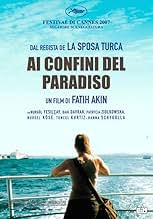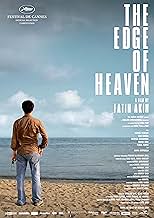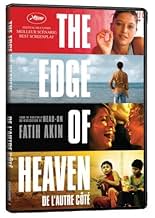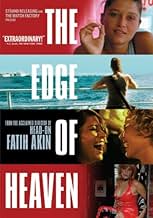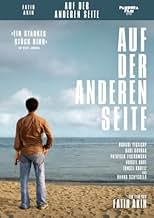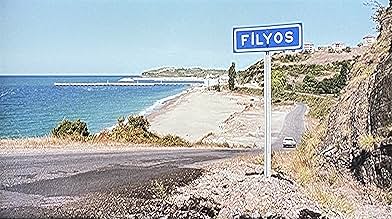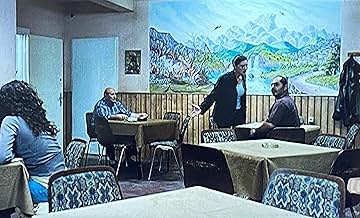NOTE IMDb
7,7/10
35 k
MA NOTE
Un homme turc se rend à Istanbul pour retrouver la fille de l'ex-petite amie de son père.Un homme turc se rend à Istanbul pour retrouver la fille de l'ex-petite amie de son père.Un homme turc se rend à Istanbul pour retrouver la fille de l'ex-petite amie de son père.
- Réalisation
- Scénario
- Casting principal
- Récompenses
- 37 victoires et 22 nominations au total
Avis à la une
The Edge of Heaven
This is such a powerful, expansive, yet intimate movie about one of the things that matters most in our times, it's hard to fault it. The acting, the events, the setting, and implications of all these characters meeting and not quite meeting, suck you in. If it seems to have a lull now and then, you end up feeling the pace of their lives, and the pace of life itself. The events, even when they have a comic twist, are so heady and difficult they could make whole films each by themselves, but here they work through several related sections within a single tapestry.
As strong as the acting is, the core of the movie is the series of events, the plot. You'll see early on some coincidences beyond reason, making the plot almost Shakespearean, and therefore artful. The roles are each character are just a little surprising, just enough to keep us curious, yet each character represents a distinctive aspect of the crosscurrents of German and Turkish cultures and worlds, such as old people assimilating and young people refusing to assimilate. Even more than the mixing of Mexican and American worlds here in the U.S., this is a dramatic and more contentious melding, fraught with all those dangers of misunderstanding we hear in the news every day. Yet when it's brought down to the level of individuals, even seemingly unyielding ones, humanity wins.
I don't know how this film will carry itself in a couple decades. As well made as it is, it feels rooted in the moment, and when the times change yet again, there might be some kind of art or magic or transcendence missing to make it fully transport a viewer. It will remain interesting, but possibly less moving. But then, maybe the themes, of parents and children, of friends looking for who they miss and avoiding who they can't stand any more, might just be universal. But as a reflection of our world right now, 2009 (or 2007, when the movie was finished), it helped clarify just what life is like out there, beyond cinematic glitter and glam, beyond hyped up violence and romance. And beyond even the limitations of documentary in creating aura.
The Edge of Heaven happens to end with such lyrical highs, the name of the movie hits you hard. We are reminded of what exists beyond all the trappings that made so many people in the previous two hours so miserable, and it's there for us to tap into and to have in common, regardless.
This is such a powerful, expansive, yet intimate movie about one of the things that matters most in our times, it's hard to fault it. The acting, the events, the setting, and implications of all these characters meeting and not quite meeting, suck you in. If it seems to have a lull now and then, you end up feeling the pace of their lives, and the pace of life itself. The events, even when they have a comic twist, are so heady and difficult they could make whole films each by themselves, but here they work through several related sections within a single tapestry.
As strong as the acting is, the core of the movie is the series of events, the plot. You'll see early on some coincidences beyond reason, making the plot almost Shakespearean, and therefore artful. The roles are each character are just a little surprising, just enough to keep us curious, yet each character represents a distinctive aspect of the crosscurrents of German and Turkish cultures and worlds, such as old people assimilating and young people refusing to assimilate. Even more than the mixing of Mexican and American worlds here in the U.S., this is a dramatic and more contentious melding, fraught with all those dangers of misunderstanding we hear in the news every day. Yet when it's brought down to the level of individuals, even seemingly unyielding ones, humanity wins.
I don't know how this film will carry itself in a couple decades. As well made as it is, it feels rooted in the moment, and when the times change yet again, there might be some kind of art or magic or transcendence missing to make it fully transport a viewer. It will remain interesting, but possibly less moving. But then, maybe the themes, of parents and children, of friends looking for who they miss and avoiding who they can't stand any more, might just be universal. But as a reflection of our world right now, 2009 (or 2007, when the movie was finished), it helped clarify just what life is like out there, beyond cinematic glitter and glam, beyond hyped up violence and romance. And beyond even the limitations of documentary in creating aura.
The Edge of Heaven happens to end with such lyrical highs, the name of the movie hits you hard. We are reminded of what exists beyond all the trappings that made so many people in the previous two hours so miserable, and it's there for us to tap into and to have in common, regardless.
"The Edge of Heaven", original title "On the other side", takes up a number of ideas from Faith Akin's previous film. But it takes them also in a new unexpected direction - with a political view (on Kurdish problem, on Europeans), with additional protagonist types - now the conflicted German Turks are joined by 'naive' Germans proper and 'seen-too-much' Turkish (Kurds) proper. All of the characters were very well constructed and, as representative types of their social groups, offered much material for the audience to reflect upon.
Indeed, a knowledgeable audience would find this film to be replete with commentary on our social and political reality, the Anatolian and the European, and on the respective preconceptions and stereotypes. Some of the commentary is tragic, some is ironic. Here, in Bulgaria, the audience laughed and applauded when the German granma said with all her conviction to the Kurdish girl that everything in her country will become alright once they join the EU. On the other hand, an émigré Kurdish audience will probably applaud a very moving and full of suspense depiction of the Kurdish struggle in Turkey, which is however frank both to Kurds and to the Turkish authorities. It included small cameos from the conflict that are for the first time openly publicised: for example, the revolutionaries as they are taken out of their hideout to be arrested by the police, announce their names to the street and the world, in apprehension of being disappeared by the authorities; minutes later the crowd of passer-bys claps to the departing police vans in a popular approval of the suppression of kurdish struggle...
Still, the myriad political and social themes are only a setting to a much more personal story. The opening of one's soul, the crossing of inner walls that separate us from those who love us. This story is repeated three times, in different context, for the three characters who remain alive to cross 'to the other side': the German mother who accepts her daughter's ideals, the German-Turkish son who forgives his father, the Kurdish girl who takes the love of her friends over her revolutionary commitment. However, the director allows no one of them to consume their redemption within the film's running time - their characters remain tragic.
It is a very powerful film. As a friend said after the screening, it tramples over you like a steam-roller. The emotional mix of the previous film "Head-on" had me cry, but crying releases the pain. This one doesn't let to release the tension even at the final scene. It will stay with you for days after.
Indeed, a knowledgeable audience would find this film to be replete with commentary on our social and political reality, the Anatolian and the European, and on the respective preconceptions and stereotypes. Some of the commentary is tragic, some is ironic. Here, in Bulgaria, the audience laughed and applauded when the German granma said with all her conviction to the Kurdish girl that everything in her country will become alright once they join the EU. On the other hand, an émigré Kurdish audience will probably applaud a very moving and full of suspense depiction of the Kurdish struggle in Turkey, which is however frank both to Kurds and to the Turkish authorities. It included small cameos from the conflict that are for the first time openly publicised: for example, the revolutionaries as they are taken out of their hideout to be arrested by the police, announce their names to the street and the world, in apprehension of being disappeared by the authorities; minutes later the crowd of passer-bys claps to the departing police vans in a popular approval of the suppression of kurdish struggle...
Still, the myriad political and social themes are only a setting to a much more personal story. The opening of one's soul, the crossing of inner walls that separate us from those who love us. This story is repeated three times, in different context, for the three characters who remain alive to cross 'to the other side': the German mother who accepts her daughter's ideals, the German-Turkish son who forgives his father, the Kurdish girl who takes the love of her friends over her revolutionary commitment. However, the director allows no one of them to consume their redemption within the film's running time - their characters remain tragic.
It is a very powerful film. As a friend said after the screening, it tramples over you like a steam-roller. The emotional mix of the previous film "Head-on" had me cry, but crying releases the pain. This one doesn't let to release the tension even at the final scene. It will stay with you for days after.
So many films tell bland stories based on clichéd characters, whose ultimate destiny is established in the first tracking shot. But this intelligent film is based on a set of interesting individuals whose evolving personal histories quietly command attention. There's an elderly Turkish man, living in Germany, capable of both gentlemanly and violent behaviour; his son, successful but shy and unconnected to those around him; the prostitute he takes as a substitute for a wife; her politically radical daughter; the German student that the daughter falls for; and the student's mother, a conservative hausfrau with a less conservative past. Their lives intersect, but messily, not neatly, and director Faith Akin chooses to end his film before being forced to a near resolution. The film doesn't exactly make you sit on the edge of your seat; but it feels both true to life and utterly personal. It's a thoughtful movie in the best sense of that word.
"Auf der anderen Seite" is the first Faith Akin-movie I have seen, and I was surprised by how balanced and mature it was. Looking at Akin's young age and the "gang"-background of his youth, I was expecting something much louder, more brutal, more explicit, more devastating. What "Auf der anderen Seite" is, is a deeply humanistic and thoughtful movie.
The thing that I loved most about it, is that every single character is written so well. No one is a villain or a bad person per se, they're all just human, struggling to do what they think is right. The actors and actresses portraying these characters are fabulous. I've rarely seen such convincing and natural performances.
Finally, the story itself is original, unagitated and beautiful. The individual plot lines don't come together as you think they would or as you think it might be best for the characters. When the movie ends, you will find that everything did resolve in a way. It's hard to explain it, if you haven't seen it. Let's just say this: "Auf der anderen Seite" doesn't have the average Hollywood-solution, but it will leave you with a lot to think about when the credits quietly start running.
This movie really impressed me, and I can't wait to finally see Akin's other works. Apparently Germany's finally got a really interesting filmmaker deserving of all the praise he gets.
The thing that I loved most about it, is that every single character is written so well. No one is a villain or a bad person per se, they're all just human, struggling to do what they think is right. The actors and actresses portraying these characters are fabulous. I've rarely seen such convincing and natural performances.
Finally, the story itself is original, unagitated and beautiful. The individual plot lines don't come together as you think they would or as you think it might be best for the characters. When the movie ends, you will find that everything did resolve in a way. It's hard to explain it, if you haven't seen it. Let's just say this: "Auf der anderen Seite" doesn't have the average Hollywood-solution, but it will leave you with a lot to think about when the credits quietly start running.
This movie really impressed me, and I can't wait to finally see Akin's other works. Apparently Germany's finally got a really interesting filmmaker deserving of all the praise he gets.
Faith Akin, renowned for his energetic movie 'Gegen die Wand', brings another story about the Turkish-German community. The movie focuses on three families who are all connected in some way. In a beautiful way Akin shows the struggle of a Turkish prostitute, a professor of German literature, a young Turkish rebel, a student English and Spanish and a retired widower to find peace and happiness in their lives. Akin manages to avoid the many pitfalls which can lead to clichés. The characters remain just ordinary people with genuine emotions and problems. The movie also depicts the impact of globalization and multiculturalism in nowadays Germany and Turkey. It's the most debated topic of our time. To what extent do we want newcomers to adapt to their new surroundings and to what extent do we accept them to cherish their own cultural heritage. In an even broader perspective, it deals with the clash between the Islamic and western world. 'Auf der anderen Seite', which means on the other side, shows how Turkish immigrants come to love their new country, Germany, without losing their Turkish roots. I think Akin invites us to try and imagine the backgrounds of people, so there will be less misunderstanding. This view is symbolized by Lotte, a German student, who decides to help Ayten, a Turkish political activist who fled Turkey. She doesn't know the Turkish girl but just wants to help her, because the girl has nowhere to go. This quest even brings her to the shores of Istanbul, a city where East meets West in the most literal way.
In the end, 'Auf der anderen Seite' is a story of love and hope which is most endearing and sheds a refreshing light on the global trend of clashing cultures. Any one who is interested in these topics and just loves a very well made movie, ought see this German-Turkish production!
In the end, 'Auf der anderen Seite' is a story of love and hope which is most endearing and sheds a refreshing light on the global trend of clashing cultures. Any one who is interested in these topics and just loves a very well made movie, ought see this German-Turkish production!
Le saviez-vous
- AnecdotesNurgül Yesilçay - who is a big star in her native Turkey - had doubts about taking on the part of Ayten as she wasn't sure how audiences would react to seeing her as a revolutionary lesbian.
- GaffesIn the film, the year is 2006 and it is the Festival of Sacrifices (Kurban Bayrami), a religious holiday. Everybody is in summer clothes and many of them are sweating. The Festival of Sacrifices in 2006 in Turkey was in winter, at the end of December.
- Citations
story: After telling the story of Abraham that was willing to sacrifice his son, Ismael, to show God his obedience. Before Abraham could slay his son God sent a lamb to sacrifice instead.
Nejat Aksu: I asked my dad if he would have sacrificed me as well.
Susanne Staub: And what did he say?
Nejat Aksu: That he would even make an enemy of God to protect me.
- Crédits fousThe film's title appears twice: in the middle of the film at 1 hour 25 mins and after the end credits.
- ConnexionsFeatured in Fatih Akin - Tagebuch eines Filmreisenden (2007)
Meilleurs choix
Connectez-vous pour évaluer et suivre la liste de favoris afin de recevoir des recommandations personnalisées
- How long is The Edge of Heaven?Alimenté par Alexa
Détails
- Date de sortie
- Pays d’origine
- Sites officiels
- Langues
- Aussi connu sous le nom de
- The Edge of Heaven
- Lieux de tournage
- Sociétés de production
- Voir plus de crédits d'entreprise sur IMDbPro
Box-office
- Montant brut aux États-Unis et au Canada
- 742 349 $US
- Week-end de sortie aux États-Unis et au Canada
- 14 257 $US
- 25 mai 2008
- Montant brut mondial
- 17 804 565 $US
- Durée1 heure 56 minutes
- Couleur
- Mixage
- Rapport de forme
- 1.85 : 1
Contribuer à cette page
Suggérer une modification ou ajouter du contenu manquant


